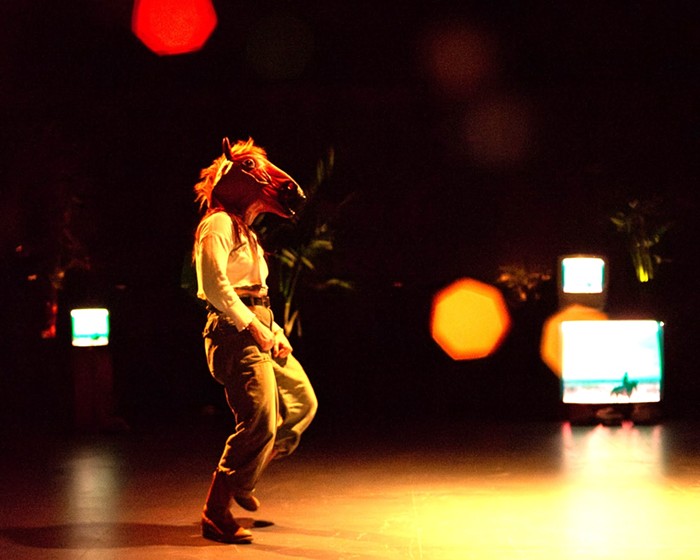
There's a scene in the 1982 film Blade Runner where futuristic bounty hunter / cop-with-a-cool-jacket Rick Deckard (Harrison Ford) shoots Pris (Daryl Hannah), a renegade "basic pleasure model" android with a penchant for violent gymnastics. In life, Pris is animated, sensual, and dangerous. But in the moment of her death she is reduced to a writhing tangle of jerking limbs, a broken toy wrapped in artificial flesh. If you have ever felt like that segment could be expanded on with (say, an hour of) interpretive dance, boy do I have the show for you.
Water Will (in Melody)'s staging is kept to four women dancers on a black stage: choreographer and director Ligia Lewis performing the work "in creation with" Titilayo Adebayo, Dani Brown, and Susanne Sachsse. The set dressing is a single climbing rope. The lighting direction employs strobes, backlit fog, and even the house lights on occasion. The dancers wear a range of outfits: silk robes to plastic coveralls. They writhe and pirouette in harsh spotlights, moving through a series of routines, and occasionally interjecting a bit of spoken word here or a musical interlude there. At times, the performance felt frustratingly enigmatic—in particular, an extended German monologue that felt like a parody of high art obfuscation. But, in general, Water Will moved quickly, and few segments overstayed their welcome.
Most of the performance's parsable dialogue has the quality of a DJ fixated on a particular sample: seemingly innocuous words and phrases looped and progressively distorted to hypnotic effect. There's an element of performative femininity to many of these sequences, with the dancers spontaneously adopting chirpy voices, wide eyes, and mechanical smiles—as though they've temporarily become malfunctioning beauty pageant robots. Layered onto that mix is an almost Cronenbergian obsession with mouths, groins, and distorted physicality. The dancers move and are moved, often against their wills, displaying expressions of panic and disassociation in their eyes. They writhe on the ground, groping themselves in ways that might seem sexual if they weren't so mechanically off-tempo.
Water Will invokes the image of a landfill for malfunctioning female bodies who were designed to be used up and discarded. Many are resigned to their fate, others are terrified, and some are seemingly complicit.
Water Will is described in the program notes as "dystopian," but I'd go a step further and say it's distinctly cyberpunk. It invokes the image of a landfill for malfunctioning female bodies who were designed to be used up and discarded. Many are resigned to their fate, others are terrified, and some are seemingly complicit. The dancers wrestle, scream, pull hair, and reach for guidance, all of this inter-cut with frequent mechanical, inhuman tics and jerks.
Teasing out a narrative from a mostly non-verbal and, at times, deliberately abstract movement is either the fun part of interpretive dance or what makes it impenetrably vague. Water Will probably won't make any new converts on that front, but there were some interesting through lines that even I, a relative neophyte, found intriguing. On a technical level, the dancers were agile, emotive, and either in concert or deliberately out of step with each other. The incidental music's Brutalist baseline, sometimes augmented with angelic choral elements, complimented the mood of the piece effectively. The rope I could take or leave, but I don't think it got in the way of anything.
We're all over this year's TBA! Keep up with us for reviews and critical impressions at: portlandmercury.com/tba


















